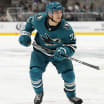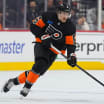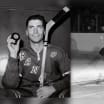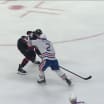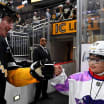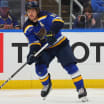BOSTON -- Three weeks and three days earlier, David Backes had lain on a table for four hours, a surgeon carving into him. Slowly and methodically, the doctor had cut out 10 inches of Backes' colon, removing the infection and, he hoped, making him well.
Backes had tried to be patient, to rest and recover after the surgery the way he needed to, the way his pregnant wife urged him to. The Boston Bruins' forward knew the timetable was supposed to be eight weeks; however, he had gotten the green light from that same doctor and a return to games beckoned. All he had left to do was test it. Test himself.
Healthy Backes at top of his game again for Bruins
Forward fueling Boston's surge after early return from colon surgery

RELATED: [5 questions entering second half of NHL season | Storylines through halfway point of season]
He pulled little-used defenseman Paul Postma in with him. They made their way to a corner of the rink at Warrior Ice Arena, with trepidation on both sides. Postma needed to push Backes around, needed to hit him. Backes needed to withstand being hit, had to know he could take it.
The surgery had come after two bouts of diverticulitis, one in August, one right before the regular season started, prompting sigmoid colon resection surgery, in which nearly a foot of the five feet total of his colon was removed and the organ stitched back together.
"I said, 'Let's go in the corner here and throw me around a little bit, let me push you around, and see if I've got any adverse reactions,'" Backes said to Postma. "I can call a timeout in the middle of you and me pushing each other, where the other team's not going to care if I'm in a game."
He couldn't run that risk.
The 6-foot-3, 195-pound Postma and the 6-foot-3, 211-pound (10 pounds lighter after the illness and surgery) Backes tangled, fighting over a puck on the afternoon of Nov. 26, prior to a Bruins-Edmonton Oilers game that neither would play in.
Postma started slowly, building, taking it easy at first. But Backes felt solid, and said he felt good and, by the end, it was "full tilt on him, like as hard as I could."
Backes survived. He felt no pain. He was ready.
Twenty-seven days after surgery, on Nov. 29, Backes returned to the Bruins' lineup.
\\\\
Three days before Backes was to head from his summer home in Minnesota to Boston for training camp and his second season with the Bruins, he got a stomachache. The family had given a going-away barbecue the day before, and Backes was getting ready to pack up the car and drive with his parents and the family pets across the country.
"That night was a bad stomachache," Backes said. "It felt like I had to go to the bathroom bad. I would sit on the toilet, nothing would happen."
Something was wrong.
He thought it might be his appendix. But the diagnosis came back as diverticulitis, a word he had heard around family gatherings, from his grandfather, his uncles. He knew what it meant to have it, and he knew what it meant to have an emergency procedure like some of his family members had been forced to endure.
The first try at fixing the problem was with antibiotics, which, along with changes in diet and hydration, can often clear up the problem and make recurrence less likely. Backes wasn't quite that lucky: It happened again.
It was after he had hosted a few of the Bruins rookies, a good night, a fun night, and then there he was, back in the bathroom, back in the hospital, with the results from a contrast CT scan that showed not just another case of diverticulitis but also an abscess in the wall of his intestine that needed to be drained.
"They had to stick the drain through my glute into my intestines to get that," Backes said. "I had two coming out of my glute with a bag I had to empty with drainage of not fun stuff happening for a week, and that was uncomfortable."
Doctors told him that statistically he was nearly certain to have another case if he chose not to have surgery, and that the next time could include a rupture, more serious complications, more time away from hockey. He missed the first five games of the season, waiting for his body to recover, then played five, the last on Oct. 30, with assurances from doctors that he would not make his situation worse.
But it was time. He had the procedure.
The expected recovery time was eight weeks.
\\\\
A couple of days after the surgery, Dr. Peter Marcello stopped by Backes' hospital room. He went over the four-hour surgery with Backes' wife Kelly and her mother, each of whom is a nurse. They got the highlights, the details, including the fact that there was still infection in the section of colon that had been removed, making Backes "a ticking time bomb."
It had been the right call.
But there was still the matter of recovery. That meant the eight-week timeline for a surgery that is often compared to a cesarean section, all while Kelly Backes was eight months pregnant, due around Christmas.
That was part of why she was so worried. This wasn't just about hockey. This wasn't just about how fast and how well he could return to the lineup. This was about their family and his future, with a 2 ½-year old daughter, a son on the way. This was about not doing anything stupid, in the rush for the immediate.
"I was trusting him, trusting his judgment," Kelly Backes said. "I know you have this job to get back to, that you are a professional athlete. But first and foremost you're a dad, you're my husband; let's talk about long term here and your health.
"This is the rest of your life, so think about those priorities as Stella's daddy. I'm pregnant, I don't want something to go terribly wrong and then have an even bigger setback."
Seven days after the surgery David Backes was on a bike, pedaling lightly at first, then harder. Kelly Backes had then watched as he went in for his two-week follow-up with the doctor, as the doctor asked him to do a sit-up, as David did one.
How do you feel?
I feel great.
Do you feel any pain?
No.
"He's like, 'All right, you're clear. You can start skating,'" Kelly Backes recalled. "And it was like, 'Wait a second. You had major surgery two weeks ago and you're going to start skating tomorrow?' Granted, no contact, but still skating. It just all felt so quick.
"I absolutely was a little hesitant to hear that, but I trust him. I trust that he knows his body and that he only wants the best for himself, that he's not going to push it because he knows that's just going to set him back. But yeah, it was quick."
Little more than three weeks prior, Backes had a 2 1-2-inch incision cut in his abdominal muscles, resulting in a smiley face that was anything but happy. Now, to the shock of his teammates, he was back among them, skating and testing, asking an end-of-the-roster defenseman to knock the stuffing out of a player with four more years and $24 million left on his deal with the Bruins.
It was surprising, to everyone. To teammates, to coaches, to fans.
He was, after all, not supposed to return for five more weeks.
"I'm sure it's been very challenging and not easy physically," Bruins captain Zdeno Chara said. "He's done a [heck] of a job to be 100 percent again and back to his performance as he was before. So, credit to him."
Backes played 18:58 in his first game back, 27 days after surgery. He scored two goals in the fourth game back, 35 days after surgery. He had six hits the in seventh game back, 43 days after surgery. He scored two more goals the 14th game back, exactly eight weeks after surgery, his original expected return date.
And as the Bruins have soared -- they are 13-3-2 since Nov. 29 -- so has he. In the past 10 games, Backes has six goals and seven assists, as his line, with rookie Danton Heinen and center Riley Nash, has given the Bruins a boost offensively in multiple games.
Backes is comfortable there, bringing out the offensive side of Nash (five goals, 13 assists) and mentoring Heinen (10 goals, 20 assists), making sure the latter knows he hardly has to defer to the veterans on the line.
The former St. Louis Blues captain is more comfortable in general; he's now in his second year in Boston after a decade with the Blues, the team that drafted him. He has made the move, found the house, had the second baby (Dawson, on Dec. 23). He's had the surgery, returned intact, exhorted a team that is now ascendant.
He doesn't need Postma to push him around in the corner after a morning skate. He doesn't have any worries or concerns. He knows the contact will come from the opponents, in the games, and that he can withstand anything they can throw at him.
"I don't think about it anymore, other than maybe a few ingrown hairs and sutures around the incision site," Backes said. "I don't think about it anymore at all."






